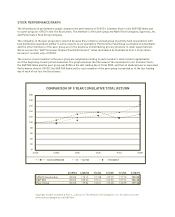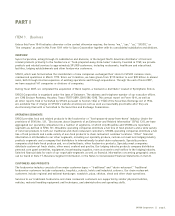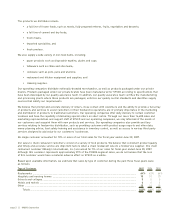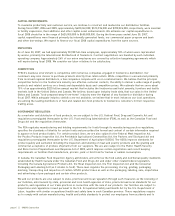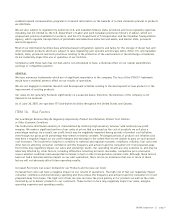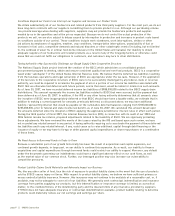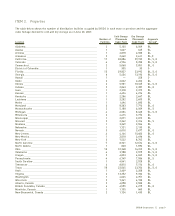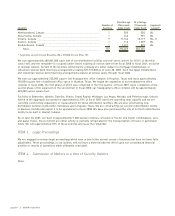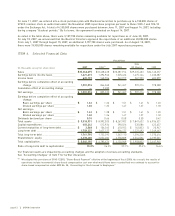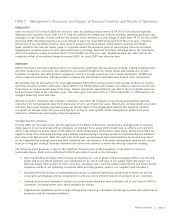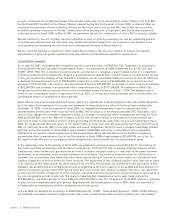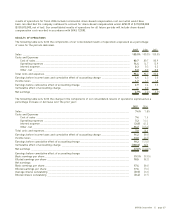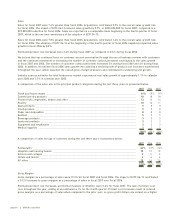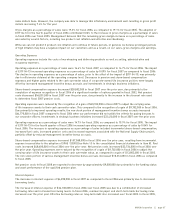Sysco 2007 Annual Report Download - page 33
Download and view the complete annual report
Please find page 33 of the 2007 Sysco annual report below. You can navigate through the pages in the report by either clicking on the pages listed below, or by using the keyword search tool below to find specific information within the annual report.Adverse Publicity Could Negatively Impact our Reputation and Reduce Earnings
Maintaining a good reputation is critical to our business, particularly to selling SYSCO Brand products. Anything that
damages that reputation, whether or not justified, including adverse publicity about the quality, safety or integrity of our
products, could quickly affect our revenues and profits. Reports, whether true or not, of food-borne illnesses, such as
e-coli, avian flu, bovine spongiform encephalopathy, hepatitis A, trichinosis or salmonella, and injuries caused by food
tampering could also severely injure our reputation. If patrons of our restaurant customers become ill from food-borne
illnesses, our customers could be forced to temporarily close restaurant locations and our sales would be correspondingly
decreased. In addition, instances of food-borne illnesses or food tampering or other health concerns, even those unrelated
to the use of SYSCO products, can result in negative publicity about the food service distribution industry and cause our
sales to decrease dramatically.
Failure to Successfully Renegotiate Union Contracts Could Result in Work Stoppages
As of June 30, 2007, approximately 9,000 employees at 54 operating companies were members of 60 different local unions
associated with the International Brotherhood of Teamsters and other labor organizations. In fiscal 2008, 14 agreements
covering approximately 2,300 employees will expire. Failure of the operating companies to effectively renegotiate these
contracts could result in work stoppages. Although our operating subsidiaries have not experienced any significant labor
disputes or work stoppages to date, and we believe they have satisfactory relationships with their unions, a work stoppage
due to failure of multiple operating subsidiaries to renegotiate union contracts could have a material adverse effect on us.
A Shortage of Qualified Labor Could Negatively Impact our Business and Materially Reduce Earnings
Our operations rely heavily on our employees, particularly drivers, and any shortage of qualified labor could significantly
affect our business. Our recruiting and retention efforts and efforts to increase productivity gains may not be successful
and there may be a shortage of qualified drivers in future periods. Any such shortage would decrease SYSCO’s ability
to effectively serve our customers. Such a shortage would also likely lead to higher wages for employees and a
corresponding reduction in our net earnings.
We may be Required to Pay Material Amounts Under Multi-Employer Defined Benefit Pension Plans
We contribute to several multi-employer defined benefit pension plans based on obligations arising under collective
bargaining agreements covering union-represented employees. Approximately 11% of our current employees are
participants in such multi-employer plans. In fiscal 2007, our total contributions to these plans were approximately
$37,296,000.
We do not directly manage these multi-employer plans, which are generally managed by boards of trustees, half of whom
are appointed by the unions and the other half by other contributing employers to the plan. Based upon the information
available to us from plan administrators, we believe that some of these multi-employer plans are underfunded due
partially to a decline in the value of the assets supporting these plans, a reduction in the number of actively participating
members for whom employer contributions are required, and the level of benefits provided by the plans. In addition,
the Pension Protection Act, enacted in August 2006, will require under-funded pension plans to improve their funding
ratios within prescribed intervals based on the level of their under-funding, perhaps beginning as soon as calendar 2008.
As a result, our required contributions to these plans may increase in the future.
Under current law regarding multi-employer defined benefit plans, a plan’s termination, our voluntary withdrawal, or the
mass withdrawal of all contributing employers from any under-funded multi-employer defined benefit plan would require
us to make payments to the plan for our proportionate share of the multi-employer plan’s unfunded vested liabilities.
Based on the information available from plan administrators, we estimate that our share of withdrawal liability on all
the multi-employer plans we participate in, some of which appear to be under-funded, could be as much as $120,000,000.
In addition, if a multi-employer defined benefit plan fails to satisfy certain minimum funding requirements, the IRS may
impose a nondeductible excise tax of 5% on the amount of the accumulated funding deficiency for those employers
contributing to the fund. Requirements to pay such increased contributions, withdrawal liability, and excise taxes could
negatively impact our liquidity and results of operations.
We Must Finance and Integrate Acquired Businesses Wisely
Historically, a portion of our growth has come through acquisitions. If we are unable to integrate acquired businesses
successfully or realize anticipated economic, operational and other benefits and synergies in a timely manner,
SYSCO Corporation ][ page 7


